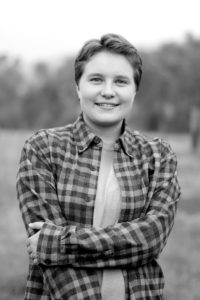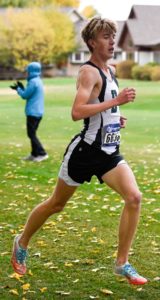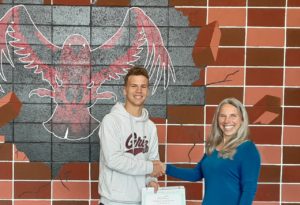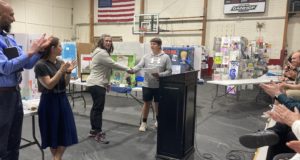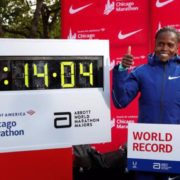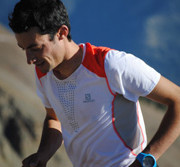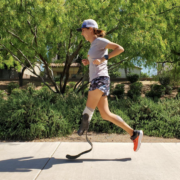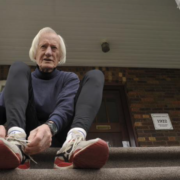That year’s BSWD scholarship winners!
A huge part of being a Wind Drinkers is the efforts we put back into the local running community, including each year we hand out scholarships to young runners to help them on the next stretch of their journey. We wanted to take a moment and celebrate the four scholarship recipients. One requirement is to submit an essay about how running has shaped your life, which each has shared with you all below.
Kyra Giese – Belgrade
When I joined the high school cross country team freshman year, I was the second-fastest girl on the team, beaten only by my older sister, who was a senior at the time. The next year, after my sister’s graduation, I was the fastest girl on the team, a surprising feat considering that I am only 5’2’’. While I am not a person who typically brags, this made me feel confident in myself and my abilities. I was used to doing well consistently and not having to worry about making the varsity team. Sophomore year, I fell just short of my goal of breaking 21 minutes in the 5k. I was not worried about falling short of my goal, I figured that I had two years left of running cross-country and expected that I was only going to get faster. But then, during the winter and spring of sophomore year, I had some trouble with my mental health. I started to stress eat and exercise less. I gained weight and lost fitness. The next year, while I was able to stay on the varsity team, I consistently ran fifth or sixth on the team instead of first. This year, I have run some varsity races and some JV ones. The shift from being the fastest on the team to having to fight for my spot on varsity was difficult. In addition to the pressure of being from a family of runners, I put a lot of pressure on myself to be fast and my ability as a runner was a big part of my identity. At the beginning of my senior year, I was very frustrated with my running, but I learned how to be content with my body and my new placement on the team. This was not the first time I had felt this way. I have struggled with my body image since middle school. My struggles on the cross-country team actually helped me to work though some of my self-esteem issues and body dysmorphia because it led me to begin to accept my worth as inherent and not a product of my fitness or body shape. I have also been able to apply this lesson to other areas of my life, including school, which has helped me reduce stress by focusing on who I am as a unique human being, not a sum of my achievements and failures. There is no magic switch that I can flip to see myself in this new light. Reforming how I think about myself is a long and ongoing process. While it can still be difficult at times, I have developed a better relationship with my body and with running. Before I had this challenge, I never took a run easy, even when I was supposed to, and often left my teammates behind if they were running slightly slower than me. I placed so much of my worth on my performance that I could not afford to give anything less than all the effort I had. Now, I am able to slow down, enjoy the run, and let my body recover from harder workouts. Also, I find myself enjoying running with my teammates much more than I used to, without feeling pressured to do better than them. I still hope to regain some of the fitness I lost and become a better runner, I plan to do so while maintaining the much healthier relationship I have developed with the sport. This experience taught me that even when I fail, I hold my head high and find my own way to be proud of myself.
Samuel Nash – Belgrade
I began running in the seventh grade when I joined my school’s cross country team. I had no intention of making it a large part of my life, no one I knew ran, I didnt even think it was a sport. Unbeknownst to me, it would change the way I lived my life forever. It gave me the first time I could admit to myself that I had cared about something, and failed at it, and I found new ambition and a deepened understanding of what it would take to achieve this ambition.
I started the day like any other, woke up, ate breakfast, and then went to school. I was missing six classes for my race, but I wasn’t worried, that was a stroll through the park for me, so familiar, so easy I could do it with my eyes closed, and I did. I never had to try hard in school, I would slack off in and out of class and still put up straight A’s, there was no reason to put in extra effort if I didn’t have to, and that was fine by me.
A friend recommended I do cross country one day after we finished soccer practice, and I figured I’d try it. I ran the minimum miles at practice for a week or two, and then it was time for a meet. I could run faster than everyone in the few practice miles I did; and I began to wonder if this would be like that pleasant afternoon stroll that I enjoyed through school. rather than the grueling trek traditionally represented by athletics. My answer was approaching rapidly.
When we finally arrived at the course I was mystified, there was no field, no referee, only a start line, and a line of cones that marked the course, there was no one here to monitor what I did or didn’t do during the race, all I had to do was stay on course. It was utter freedom over my own actions, freedom to succeed or fail as I pleased. So different from the usual structured games with their rules and coaches always deciding what we did on the field. In light of this freedom, I saw no reason why this should not be my race to win.
There was a moment of elation as the gun fired, I erupted from the line, focused on nothing but getting in front, I felt my legs pounding, faster than I could run for the whole race, but I knew we would begin to slow down. I was in front within ten seconds, as I felt my pace slow ever so slightly, no one was approaching me, I was in the clear. I had no idea who was behind me or how far away they were, but it didn’t matter, I was going to stay winning for two and a half miles. Easy. I ate up the turns, flew up hills, and sped down them, relishing my victory, before I even heard my first mile time. It was exactly how I imagined it, a dominant performance, the inevitable win that was becoming more and more solid with every step.
This fantasy collapsed with around a half of a mile to run, my confidence began to waver as a problem emerged: it was getting harder to run, faster than I was approaching the finish line. I was suddenly and startlingly aware of the two runners right behind me. Was Their breath steadier than mine? How were they still going so fast? I tried to force more effort out of myself, fighting my lungs to breathe harder or my heart to beat faster, I wanted to go beyond them, to do more than I could, but there was no response. I was too tired. This was a situation I wasn’t ready for, I couldn’t lose, I wanted to win so bad, this wasn’t the stroll I wanted, and I found myself on the familiar lower slopes of the mountain of difficulty which I had never ventured far up. I didn’t know what to do, and so I did nothing.
I ended up 4th in that race, a position I told myself I was proud of, but one that disappointed me nonetheless. I didn’t know how to feel, I hadn’t made a mistake in the race, I fought through the start to the end, so how did I lose? Easy. I had been outworked. I had messed around in practice and I lost because of it. I hadn’t taken my preparation seriously, and I lost because of it. I had done things the way I always did them when I succeeded, and I lost because of it. It turned out that running was neither as peaceful as school nor as demoralizing as other sports, but something in between. With success not so elusive to be deemed impossible, nor dropped directly into my lap, but rather just barely, tantalizing, out of reach, on
the crest of a molehill, a hike, but certainly not the trek I had come to fear. I understood that true success here was hard, physically and mentally, but for the first time, that did not scare me, rather I relished the challenge.
I began to pour more of myself into the things I did, first running, doing more at practice, and then eventually outside of it. This attitude soon spilled over into my schoolwork as I sought to challenge myself with more rigorous courses. My desire for a success that was just out of reach increased, as did my will to get there.
I talk to the younger runners on the cross country team now sometimes, and I see who I was inside of them, either too headstrong to believe they can lose, too disheartened to believe they can win, or somewhere in the middle. They are always set straight eventually, either humbled or inspired, and I attempt to guide them. I help them cultivate their new talents and can not be more proud to see their success. Especially when I get to watch the climb to the top, and whether it is summiting a great mountain, hiking a molehill, or simply strolling through the park, I am still proud to see their goals realized.
Their journey is my great joy in life. Running saved me from becoming a passive observer in my own life, it taught me how to understand difficulty rather than impossibility. Without my experience in running, I never would have pursued the challenges that I have now, I never would have failed, but I also never would have truly felt the success that can only emerge from feeling oneself lifted beyond previously thought up limitations, as I never would have left the comfort of my own ability.It is due to this great debt I owe the sport, that I take such happiness in helping those around me find it, I feel it allows me to give back to the sport that so radically changed the way I lived.
Samuel Konen – Twin Bridges
Running, My Worst Enemy
Since I was a kid the thing I always dreaded most was running. Whether it was laps around the gym at PE, tag at recess, or conditioning during little league football, I absolutely hated running. It wasn’t because I was lazy or thought I was too good for running, it was because I was awful at it. I was always the last in races and the slowest on the team, it was always such an embarrassing feeling for me. One of my worst memories from childhood was my 5th-grade county track meet during which my coach forced me into doing the 800-meter race. It was absolutely brutal, I came in last, but not just last, I managed to get lapped. I got lapped in the 800-meter race, a two-lap race! Everyone watched and laughed at me, it made me feel so insecure and ashamed that I almost quit every sport. So as a kid what running meant to me was a reminder that I wasn’t good enough, that I was too slow, and that I was an embarrassment.
I chose not to run track through high school, for fear that I would embarrass myself again. I continued my other sports of football and basketball throughout high school, but those didn’t go much better. However, unlike in 5th-grade, I didn’t let my shortcomings discourage me. I continued to work hard and it eventually paid off. No matter how bad the game went or how tired I was, I kept working. Countless hours were spent in the gym and weight room so I could improve my skills. I went from benchwarmer to starter, from water boy to all-conference. But, even as I got faster, stronger, and improved in my other sports, there was still a fear of returning to the track.
This year, after some strong convincing from my coach, I decided to go out for track once again. The confidence and encouragement from my coach gave me the courage to go out again no matter what happens on that track. The first track meet was last week. On the bus ride over, all I thought about was how I was going to fail and embarrass myself just like before. The meet came and went, and I was far from a state champion, but I did surprisingly well and showed lots of potential. That anxious feeling of failing was gone.
So what does running mean to me? Running was a symbol, a symbol for all the things I chose not to do because I feared failure. I missed out on countless opportunities because I thought I was going to lose. But the true loss was missing out on countless opportunities to have fun and improve myself. Running, even though I hated it for years, helped me realize that we cannot fear failure. We have to accept that failure is a possibility, in every aspect of life, and it shouldn’t hold us back from doing the things we enjoy.
Landon Scott – Manhattan Christian
Throughout my high school years I have been a part of both the cross country and the track team. I have had both great experiences and experiences that have challenged me. These challenges didn’t just occur in these specific sports seasons, instead they all began when I was born. When I was born, I was born with a pretty severe case of clubfoot. Clubfoot is when the tendons within the foot are not formed correctly and the result is an inward turned foot. Throughout my first couple years of life, I had several surgeries, I was in a wheelchair for a couple of months, and I also had several different casts on my left leg from the knee down. As time went on I grew stronger and when I turned 3 I was eventually able to walk without crutches and without a cast on. Between the ages of 3 to about 13, I was able to run without pain and I was able to participate in several sports. The sports that I participated in were tee ball, baseball, soccer, basketball, track, football and I also ran in several big 5k races in that time. As time went on and when I was in 7th grade, I began to notice an unusual tightness in my left foot and a random aching that was just annoying at first. As time went on and when my freshman cross country season came around the pain and the tightness started to become unbearable and whenever I tried to run, there was such an enormous amount of pain that I couldn’t run even if I wanted to. After cross country season ended my parents and I traveled to my foot doctor at Shriners in Portland, OR. This appointment would be one that I would remember for years to come, because I found out that this would be the start to a series of surgeries that would put me out of sports for about three-quarters of a year. This was because I needed to have a reconstructive leg surgery, and they would have to remove a piece of my tibia and fibula and hold the bone together with a plate with eleven screws. However I pulled through and was able to manage for the cross country team the following fall and even participate in basketball.
The next year however I had to have another surgery to remove the plate and screws from the bone in my leg. Between the first surgery and the second one, I had spent several months on crutches, several days in the hospital, and countless hours on the road to recovery through sessions of physical therapy. There were good and bad days within that mix, but throughout that time I realized how much I actually took for granted. It was a miracle in the first place that I could even walk, run, and do things that kids should have every right to do. There are so many people in this world that have been born with disabilities or have become disabled that cannot enjoy the action of running. Over the course of this past year I was finally able to run in a cross country meet again, and that entire season I never took anything for granted and I was excited for the practice, even if it was a hard day. Also since track has started I have run my first 100 meter dash since middle school. Even on days when it hurts, I still try my best to push through the pain and run, because it is a miracle in itself that I can even do this stuff. This is what running means to me, to find joy and gratitude through the good days and the hard days, to use the gift of running to help others in times of need or hardships, and to not take our mobility for granted. Running is a gift, a gift that cannot be replaced. I have learned this through my athletic experiences and it is something that I will remember for the rest of my life.


